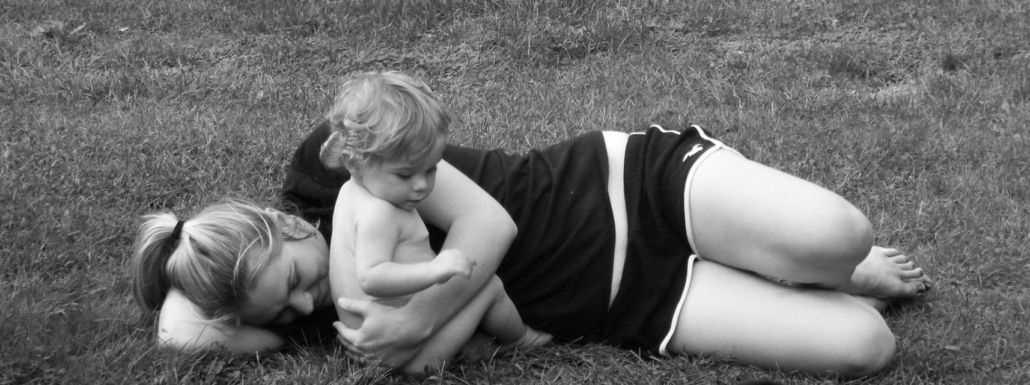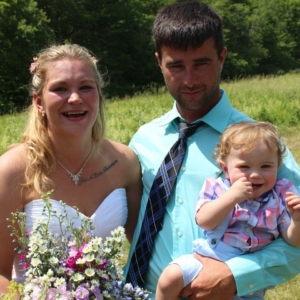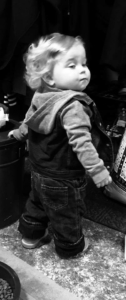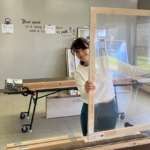A mother’s instinct gives her son the chance he needed

Lacey and Chance Cunningham
by Jeanne Marquis
A local toddler, Chance Cunningham, from China, received a successful bone marrow transplant in Boston, Massachusetts, to fight a rare disorder of his immune system, Hemophagocytic Lymphohistiocytosis, or HLH. Chance and his parents Lacey and Jeremy Cunningham returned home on the weekend of March 2, following a long, emotional stay in Boston.
Lacey’s strong mothering instinct led to the early diagnosis of her young son’s HLH. She knew what he was experiencing was more than the typical childhood illness when Chance’s fever wouldn’t break and she felt hardening around his stomach area. Mothers know when something is wrong. What she didn’t know at the time was just how serious this illness could be until she and her husband Jeremy arrived at the Boston Children’s Hospital. It became real when a staff member told Lacey, “It’s very hard for parents of chronically ill children.” She said, “I was taken aback, like whoa, my son, my baby is considered to be chronically ill.”
Left unchecked, the ailing immune system becomes overactive and attacks healthy organs and tissues. The treatment for HLH is to literally rebuild the immune system. The existing immune system needs to be inactivated by chemotherapy and replaced by a bone marrow transplant from a compatible and healthy donor.
The search for an appropriate bone marrow donor is more challenging than one would think. You might assume that family members are the best match. However, according to the Health Resources and Services Administration, only 30 percent of patients have a relative that is a suitable match and able to donate. The other 70 percent, nearly 12,000 people in the US, depend on a worldwide registry of bone marrow donors for this lifesaving transplant.
Chance’s donor came all the way from Germany. There is a desperate shortage of bone marrow donors in the U.S. On average 3,000 Americans die every year waiting for transplants, while only two percent of our population is listed on the registry for bone marrow donors. Bone marrow transplants are the only cure for HLH, the disease Chance is fighting, and other diseases such as Leukemia, the most common childhood cancer.
When Lacey was interviewed for this article, she asked us to focus more on the need for bone marrow donors than her own story because it is the only cure for many people like her son Chance. There is no alternative. She urges people to list themselves on the national registry for bone marrow transplants. She and her husband Jeremy are extremely thankful for the woman in Germany who donated her marrow. They are grateful for her physical donation of life-saving cells and also for her unfailing time commitment. The donor remained dedicated to the protocol even when the procedure was postponed three times due to Chance’s battle with HLH flare ups.
The National Marrow Donor Program (NMDP) is a nonprofit organization established in 1986 and operates the Be The Match Registry, the world’s largest hematopoietic cell registry. Large numbers of registered donors are needed, especially from ethnic populations, because the odds that two individuals are HLA matched are one in 20,000. The success of a donor match depends on a registry with a large number of participants. To register as a donor, visit BeTheMatch.org and answer a questionnaire. If you are a candidate to be a donor, you will be sent a cheek swab kit in the mail.
The family of Chance Cunningham has set up a GoFundMe account to help with medical expenses at www.gofundme.com/big-cheers-for-little-chance-cunningham.
See also: Debunking the myths about donating bone marrow
Responsible journalism is hard work!
It is also expensive!
If you enjoy reading The Town Line and the good news we bring you each week, would you consider a donation to help us continue the work we’re doing?
The Town Line is a 501(c)(3) nonprofit private foundation, and all donations are tax deductible under the Internal Revenue Service code.
To help, please visit our online donation page or mail a check payable to The Town Line, PO Box 89, South China, ME 04358. Your contribution is appreciated!





Leave a Reply
Want to join the discussion?Feel free to contribute!